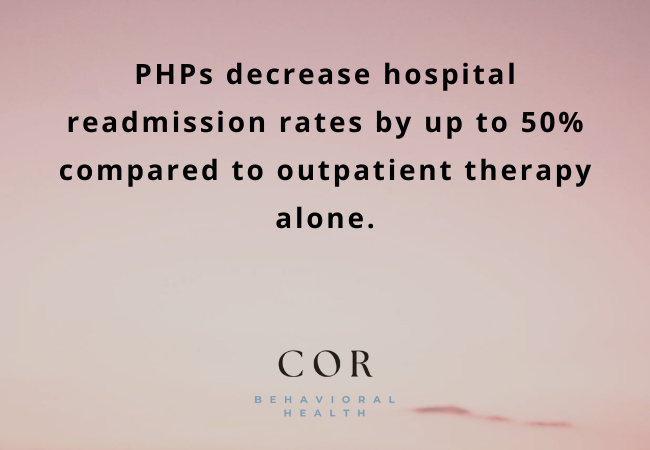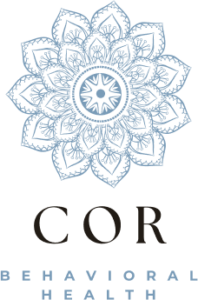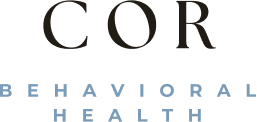
When you’re struggling with mental health challenges, finding the right level of care is critical. For many people, outpatient therapy isn’t enough—but inpatient hospitalization feels too restrictive. In these cases, a Partial Hospitalization Program (PHP) can be the perfect middle ground.
At COR Behavioral Health, our Partial Hospitalization Program in Martin County, Florida, offers a structured, evidence-based path toward healing—without requiring overnight stays. PHP empowers individuals to rebuild their lives, develop lasting coping skills, and strengthen their mental health, all while maintaining important ties to their community and home life.
In this guide, we’ll break down the five major benefits of PHP, explain what you can expect day-to-day, and help you determine if this path might be right for you.
What Is a Partial Hospitalization Program (PHP)?
A Partial Hospitalization Program provides intensive mental health treatment for individuals experiencing moderate to severe symptoms who do not require 24/7 inpatient hospitalization.
Key Features at COR Behavioral Health Include:
- 5–6 hours of therapeutic services daily, Monday–Friday
- Weekly Individual Therapy in Martin County, Florida sessions
- Daily Group Therapy in Martin County, Florida for skill-building and support
- Psychiatric evaluations and medication management
- Crisis intervention and relapse prevention services
- Family involvement and education
- Personalized discharge and aftercare planning
PHP bridges the gap—providing intensive support in a flexible, empowering environment.
1. Comprehensive, Structured Daily Support Without Inpatient Admission
For individuals whose symptoms have escalated beyond the point of weekly therapy but who do not require full hospitalization, PHP offers a powerful solution.
What daily structure looks like:
- Morning check-ins and mindfulness practice
- Skill-building groups focused on emotional regulation, communication, or relapse prevention
- Psychoeducation sessions to better understand mental health diagnoses and treatments
- Individual therapy focused on processing emotions, trauma, or challenges
- Psychiatric medication management as needed
Real-World Example:
Sarah, a 29-year-old battling PTSD and severe anxiety, found herself overwhelmed after outpatient therapy plateaued. She entered COR Behavioral Health’s PHP and, through daily structure, quickly regained a sense of stability—without needing full hospitalization.
Emotional Impact:
This daily consistency reduces emotional chaos, stabilizes moods, and builds momentum toward healing.
2. Faster Symptom Stabilization and Practical Coping Skill Mastery
Unlike outpatient therapy, which may only offer one session a week, PHP offers daily therapeutic exposure—creating faster gains in emotional regulation, coping strategies, and symptom management.
At COR Behavioral Health, you will:
- Learn DBT and CBT skills for managing intense emotions
- Practice mindfulness and grounding techniques
- Build healthier thought patterns through cognitive restructuring
- Role-play real-life scenarios to practice setting boundaries and assertiveness
Real-World Example:
Miguel, a 24-year-old with severe social anxiety, learned to manage panic symptoms within four weeks by practicing breathing techniques, challenging cognitive distortions, and role-playing exposure activities during daily groups.
Clinical Benefit:
When coping skills are practiced daily—with professional guidance and immediate feedback—they become second nature far faster than weekly outpatient therapy allows.
3. Smooth Transition Across a Full Continuum of Care
PHP at COR Behavioral Health isn’t a standalone solution—it’s part of a full spectrum of integrated care options.
Your journey may look like:
- Partial Hospitalization Program (PHP): Stabilization and intensive healing
- Intensive Outpatient Program in Martin County, Florida (IOP): Flexible structured care 3–5 days a week
- Outpatient Individual Therapy: Ongoing support for long-term maintenance
- Alumni groups and support networks for aftercare
Real-World Example:
After graduating from PHP, Jana transitioned seamlessly to IOP, maintaining structure while preparing for a return to work. Eventually, she moved into weekly outpatient sessions and now thrives in her career.
Continuity Is Key:
Smooth transitions between levels of care drastically improve recovery rates and reduce relapse risks.
4. Flexibility to Maintain Home Life and Personal Responsibilities
Many individuals hesitate to seek treatment because they cannot step away from responsibilities like children, pets, work, or school. PHP solves this dilemma.
At COR Behavioral Health:
- Clients attend therapy during the day but sleep at home.
- Real-world skills are immediately applied outside treatment hours.
- Family dynamics and daily routines become part of the healing process, not disruptions to it.
Real-World Example:
Tyrell, a single father, attended PHP while managing his parental responsibilities. He was able to receive intensive treatment during the day while still being home with his daughter each evening—strengthening his recovery and his bond with his family.
Emotional Benefit:
Clients feel empowered to heal without abandoning the parts of their lives they value most.
5. Building Connection Through Group Therapy and Peer Support
Isolation often worsens mental health conditions. Group therapy in PHP offers safe spaces to rebuild connection, trust, and social skills.
At COR Behavioral Health’s PHP, clients participate in therapist-led group sessions that foster:
- Emotional vulnerability and authenticity
- Communication skill-building
- Conflict resolution practice
- Empathy and perspective-taking
- Peer encouragement and hope-sharing
Real-World Example:
Maya, struggling with severe depression, thought no one could understand her pain. Through group therapy at COR, she found validation, friendship, and hope from others on similar journeys.
Clinical Reality:
Research shows group therapy participants often experience greater reductions in shame, loneliness, and self-stigma than individual therapy alone.
How PHP Supports Long-Term Mental Health Recovery
When people seek mental health treatment, the ultimate goal isn’t just immediate symptom relief—it’s achieving sustainable, long-term well-being. Partial Hospitalization Programs (PHP) aren’t just designed for crisis stabilization; they actively build a foundation for lifelong mental health recovery.
At COR Behavioral Health, our Partial Hospitalization Program in Martin County, Florida focuses on both immediate needs and future resilience.
Here’s how PHP promotes lasting recovery:
-
Skill Development for Life:
Clients don’t just learn how to survive emotional pain—they learn how to navigate it. Through therapies like CBT, DBT, and mindfulness training, individuals leave PHP with practical coping strategies they can use for a lifetime. -
Stronger Emotional Regulation:
Daily therapy teaches clients to recognize emotional triggers early and regulate their responses, reducing the risk of relapse or emotional overwhelm down the line. -
Insight Into Triggers and Patterns:
PHP helps individuals identify the underlying thought patterns, relationship dynamics, or life events that contribute to emotional distress—empowering them to make healthier choices moving forward. -
Building Healthy Routines:
Regular attendance in PHP reinforces healthy habits such as sleep hygiene, nutrition, physical wellness, and consistent self-care practices that improve mental health sustainability. -
Step-Down Support Structure:
After completing PHP, many clients transition into Intensive Outpatient Programs in Martin County, Florida (IOP) or ongoing individual therapy, allowing for a gradual reduction in clinical intensity while maintaining support.
Common Myths About Partial Hospitalization Programs—and the Truth
Even though Partial Hospitalization Programs offer life-changing benefits, many people hesitate to consider PHP due to common myths and misconceptions. Let’s clear those up.
Myth 1: “PHP is the same as being hospitalized.”
Truth:
While inpatient hospitalization is 24/7 care for individuals in acute crisis, PHP is daytime treatment only. Clients return home every evening, maintaining independence while still receiving intensive therapeutic support during the day.
Myth 2: “If I need PHP, it means I’m ‘really sick.’”
Truth:
Choosing PHP isn’t a sign of failure—it’s a sign of strength and self-awareness. PHP is for people who recognize they need more than weekly therapy to stabilize, learn new skills, and move toward recovery. Seeking appropriate help is a courageous act.
Myth 3: “Group therapy will be uncomfortable or judgmental.”
Truth:
Group Therapy in Martin County, Florida at COR Behavioral Health is led by experienced clinicians who foster safe, respectful, and supportive spaces. You participate at your comfort level and often find that hearing others’ stories reduces your own sense of isolation and shame.
Myth 4: “PHP is only for people with severe mental illness.”
Truth:
While PHP does support individuals with significant challenges, it’s also ideal for people facing moderate but disruptive issues like major depression, anxiety, PTSD, grief, or life transitions. You don’t need to be in crisis to benefit.

Who Is an Ideal Candidate for PHP?
Consider PHP if you or your loved one is:
- Struggling with moderate-to-severe depression, anxiety, trauma, or mood instability
- Recently discharged from an inpatient facility and needs a step-down level of care
- Experiencing intense emotional distress but remains safe at home
- Requiring more than weekly outpatient therapy to manage symptoms
- Open to participating in both individual and group sessions
What Daily Life Looks Like in PHP at COR Behavioral Health
- 9:00 AM: Morning check-in and mindfulness grounding exercise
- 10:00 AM: Skill-building group (DBT or CBT focus)
- 11:30 AM: Psychoeducation workshop on emotional regulation or coping strategies
- 12:30 PM: Lunch and peer interaction
- 1:30 PM: Group Therapy session
- 2:45 PM: Daily reflection, goal setting, and discharge planning
The structure fosters emotional safety, skill acquisition, peer connection, and therapeutic progress every single day.
Why Choose COR Behavioral Health?
At COR Behavioral Health, we believe in healing the whole person—not just treating symptoms. When you enter our PHP, you’re stepping into a compassionate community rooted in expertise, structure, and personalized care.
Why Clients Trust Us:
- Trauma-informed, evidence-based practices
- Compassionate, experienced clinical team
- Low client-to-staff ratios for personalized support
- A seamless continuum of care: PHP, IOP, outpatient, and aftercare
- An inclusive, welcoming environment that honors your story
You deserve treatment that meets you where you are—and helps you grow beyond where you’ve been.
Conclusion
Healing isn’t just about surviving—it’s about rebuilding your life with strength, skills, and hope. A Partial Hospitalization Program at COR Behavioral Health gives you the daily support, peer connection, and real-world coping strategies you need to stabilize and thrive.
You are not broken. You are not alone. You are ready. Call COR Behavioral Health today at 888.231.7973 to schedule your confidential assessment and discover how PHP can empower you to reclaim your life with confidence, clarity, and connection.
Frequently Asked Questions (Expanded)
How long is a typical PHP program?
Most clients attend PHP for 4–6 weeks, but treatment duration depends on progress and individual needs.
Can I work part-time while attending PHP?
PHP is a daytime commitment (5–6 hours), but many clients work part-time in the evenings or weekends as they stabilize.
Will I have access to psychiatric care?
Yes, psychiatric evaluations and medication management are an integral part of the program.
What happens if I relapse emotionally during PHP?
Our clinical team is equipped to support emotional relapses compassionately, adjusting care plans as needed without judgment.
Does insurance cover PHP?
Most major insurance providers cover PHP. Our admissions team will assist you with insurance verification and benefits explanation.



